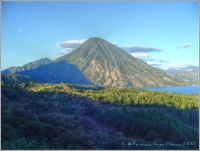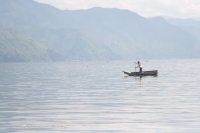Lake Atitlan Travel Guide
Santiago Atitlan is a quiet but strong community surrounded by forested slopes and three distinctive volcanoes at what many people have dubbed the most beautiful lake in the world, Lake Atitlan. Not only is Lake Atitlan scenically spectacular, the lake and hillside settlements are also rich in Mayan culture.
Some of the villages in the area are the only ones in the country where people still wear traditional clothing in day to day life, with each village sporting its own distinctive style and colour of densely embroidered dress.
The people are famous for their artisan crafts and the design and colour of the textiles, distinguishing one village from the other. The hues blend into an artisanal mosaic on market days, when villagers from around the lake gather to sell their products. The Friday market at Sololá is one of the best in the highlands.
Around the lake are the main tourism centres of Panajachel and San Pedro La Laguna, with lots of accommodation, small restaurants, and craft shops. Santiago Atitlan is one of the most important cultural villages along the shore, with a strong attachment to ancient Mayan culture and religion. There are good hikes around the lake as well as various water sports and excellent spots for swimming or relaxing at the water's edge.
Things to do in Lake Atitlan
At first glance, Lake Atitlan may seem like any resort destination, a picturesque, tranquil place to rest and relax. Yet, this is the heartland of traditional Mayan culture in Guatemala, ringed by several dormant volcanoes and verdant forest rich with wildlife, waiting to be explored.
For the active, summiting Volcan San Pedro is a truly off-the-beaten-track challenge; without a local guide and a machete to cut through the brush, the trip can be dangerous, even for the most experienced trekkers, but therein lies the fun! There are also plenty of other excursions, such as motorcycling and paragliding through surrounding areas, as well as kayaking and cruising on the lake.
Panajachel, a hippie haven in the 60s, offers good tourist amenities and a bohemian atmosphere that will be familiar to many travellers. The surrounding villages, however, are places to learn about local folklore, arts, and crafts handed down by many generations of Mayans. Come here and leisurely explore all of them as a welcome guest, which, in combination with the numerous adventure activities available, make Lake Atitlan a richly rewarding resort stop.

Volcan San Pedro
The Volcan San Pedro is located behind San Pedro La Laguna and offers one of the most spectacular views in the world. The hike is strenuous and is around 6 hours round trip depending on fitness levels, but the rewards are well worth the effort. The starting sections include a rough trail, after which it is all jungle trekking. It is advisable to hire a local guide, as there is no signage and this is one of the wildest areas in the country, a truly adventurous hiking experience.
.jpg)
Panajachel
The holiday resort town of Panajachel in the highlands has a large population of long-term hippie expats and a distinctly Western character. The relaxed ambience accompanies breathtaking views of three volcanoes that sit near the lake. There are many hotels, small restaurants, and lively nightspots, with a mosaic of sensory delights awaiting visitors. Visit the photo museum in the Casa Cakchiquel, a historic hotel that has housed legends such as Che Guevara and Ingrid Bergman. The Church of St Francis, built in the 16th century, has survived several earthquakes, and still provides sanctuary to the locals. Panajachel is a good base for exploring the more traditional villages surrounding the lake and offers good shopping and swimming around the town. Food lovers will enjoy sampling the diverse local cuisine in one of the numerous restaurants or cafés.

San Pedro La Laguna
The holiday destination of San Pedro La Laguna has a relaxed bohemian feel and it comes as no surprise that it is one of the most popular places for a summer holiday in Guatemala. The village revolves around the Catholic Church and the market place, with narrow cobbled streets leading up the hill, away from the ferry docks. Coffee plantations surround San Pedro La Laguna, and picturesque paths lead to the lake, where boulders and small stretches of beach provide peaceful sunbathing and swimming spots. There are also thermal pools in the village offering superb views of the nearby volcanoes. These hidden oases are a great way to relax after some rewarding hiking up the Volcán San Pedro behind the village.
Guatemala travel info
Electricity
Electrical current is 120 volts, 60Hz. A variety of plugs are in use including the flat two-pin (Type A).
Language
The official language is Spanish, but English is understood in hotels and tourist destinations. In addition, there are many indigenous languages spoken in Guatemala as well.
Money
The official currency is the Guatemalan quetzal (GTQ), which is divided into 100 centavos. Cash exchange is easy, but visitors are advised to exchange money in hotels, at banks or at foreign offices rather than the informal booths on the street. It's only possible to exchange US dollars in Guatemala.
There are ATMs in the towns and cities but they aren't always reliable. Credit and debit cards have been cloned after use at ATMs, so visitors should check ATMs for evidence of tampering. Compromised machines may not be easy to spot, though. Credit cards are widely accepted.
Tipping
Generally a 10 percent tip is recommended for good service in Guatemala. It is customary to tip waiters if a service charge hasn't been added to the bill and tipping extra for excellent service is also customary. Taxi drivers are not usually tipped. Hotel staff and tour guides expect to be tipped for their services and can be more favourable in their service when receiving generous tips.
Health
Travellers visiting Guatemala should take precautions against malaria, which occurs in the low-lying areas outside Guatemala City. They should also take insect-bite protection measures for dengue fever and Zika virus. A yellow fever certificate is required from travellers entering the country from infected areas; hepatitis A and B, and typhoid vaccinations are recommended, as is an MMR (Measles, mumps and rubella) update.
Visitors should stick to bottled water, or boil all water before drinking if bottled water is unavailable. Good travel insurance is necessary and visitors should use private clinics where possible. All medication should be accompanied with a signed and dated letter from a doctor explaining what the medication is and why it is needed.
Safety
Visitors should take sensible precautions after dark in Guatemala City, and should note that pickpocketing and petty theft are common in tourist areas and market places. They should also avoid cheaper buses when travelling on tourist routes from Guatemala City to Antigua, and from Antigua to Panajachel, as robberies have been known to take place.
The rainy season between April and November usually brings about heavy rain and flooding, mudslides, and hurricanes. Guatemala has active volcanoes, so it's important to keep track of any volcanic activity.
Local customs
It is very common to greet most people, especially in the countryside. Clothing need not be too conservative. However, modesty is advised for female travellers in order to avoid unwanted attention.
Visitors should ask permission before taking photographs, particularly of children, as locals are suspicious of foreigners approaching kids for pictures due to incidences of kidnapping, particularly in remote areas where tourists have been attacked. A small tip might be required.
Military clothing is illegal, so travellers should avoid camouflage-patterned clothing. Public displays of affection between same sex couples should be avoided, particularly outside of Guatemala City.
Doing business
Business etiquette in Guatemala is similar to the rest of Latin America. Due to the warm, humid climate, men often wear lightweight suits. Women usually wear a dress or a skirt with a blouse. Foreigners should always be punctual for meetings, as Guatemalan business people are very punctual.
Foreigners should use professional titles such as such as doctor, professor, ingeniero (engineer) or abogado (lawyer), or should otherwise address colleagues as assenor (Mr), senora (Mrs), and senorita (Miss), followed by their last names.
Speaking softly is considered polite. Business cards may be exchanged although there is no ritual around it. Business hours are generally 8am to 5pm, Monday to Friday, with an hour taken over lunch; business lunches or breakfasts are preferred over business dinners.
Duty free
Travellers to Guatemala over 18 do not have to pay duty on 80 cigarettes and two bottles of liquor or spirits.
Communications
The international access code for Guatemala is +502. The outgoing code depends on what network is used to dial out on, which is followed by the relevant country code (e.g. +44 for the United Kingdom). WiFi connections are available in the cities and main tourist areas, and many hotels, hostels and language schools will offer reasonable internet rates. Travellers can purchase local SIM cards for unlocked phones.
Passport & Visa
It is strongly recommended that all foreign passengers to Guatemala hold return or onward tickets, and the necessary travel documentation for their next destination. Travellers should note that the period of stay for visa-exempt nationals is 90 days; however, 90-day extensions can be organised through the Immigration Office. For nationals requiring a visa, the consulate issuing the visa will advise visitors about the amount of deposit to be paid at the port of entry in Guatemala, which will be refunded when the visitor leaves Guatemala. It is highly recommended that travellers' passport have at least six months' validity remaining after the intended date of departure from their travel destination. Immigration officials often apply different rules to those stated by travel agents and official sources.
Entry requirements
US citizens must have a passport that is valid for the period of intended stay in Guatemala. No visa is required for stays of up to 90 days.
British citizens must have a passport that is valid for the period of intended stay in Guatemala. No visa is required for stays of up to 90 days for British passport holders endorsed British Citizen. Those holding passports with other endorsements should confirm entry requirements before travel.
Canadian citizens must have a passport or replacing document that is valid for the period of intended stay in Guatemala. No visa is required for stays of up to 90 days.
Australian citizens must have a passport valid for the period of intended stay in Guatemala. No visa is required for stays of up to 90 days.
South African citizens must have a passport valid for the period of intended stay in Guatemala. No visa is required for stays of up to 90 days.
Irish citizens must have a passport valid for the period of intended stay in Guatemala. No visa is required for stays of up to 90 days.
New Zealand citizens must have a passport valid for the period of intended stay in Guatemala. No visa is required for stays of up to 90 days.
Useful contacts
www.visitguatemala.com
110 (Police), 122 (Fire Department), 123 (Medical emergencies), 1500 (PROATUR, the tourist assistance unit, provides 24-hour help).Embassies / consulates in other countries
Guatemalan Embassy, Washington DC, United States: +1 202 745 4953 or info@guatemala-embassy.org
Guatemalan Embassy, London, United Kingdom (responsible for Ireland): +44 207 2211 525, or info@embaguate.com
Guatemalan Embassy, Ottawa, Canada: +1 613 233 7188 or www.canada.minex.gob.gt
Embassy of Guatemala, Canberra, Australia: +61 26189 1311
Guatemalan Honorary Consulate, Cape Town, South Africa: +27 21 418 2020 (Johannesburg: +27 11 804 5080)
Embassies / consulates in Guatemala
United States Embassy, Guatemala City: +502 2326 4000.
British Embassy, Guatemala City: +502 2380 7300.
Canadian Embassy, Guatemala City: +502 2363 4348.
Australian Embassy, Guatemala City, Guatemala: +502 2328 0300
South African Consulate, Mexico City (responsible for Guatemala): + 521 55 1100 4970
Irish Consulate, Guatemala City, Guatemala: +502 535 35349
New Zealand Consulate, Mexico City (responsible for Guatemala): +52 55 5283 9460


